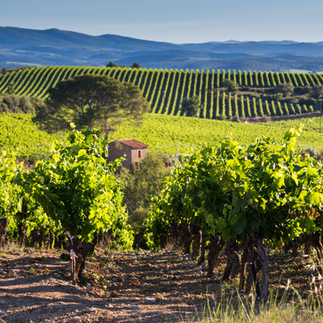Climate events of recent years have reminded us of how important our sustainability initiatives are to reduce our impact on the planet and build a sustainable wine legacy for the future generations.
We are lucky to have a natural and healthy biodiversity at Château Cazal Viel and Château Auzines. Our St Chinian vineyards are divided by wild hedges and shrubs, while the Auzines estate has only 50 hectares of the 270 hectare estate planted to vine - the rest has been left to nature. The air there is scented with the herbs and garrigue that dot the landscape and the estate hums with insect and animal life. We are also proud to be HVE Level 3 certified, a rigorous assessment with very strict specifications, created and controlled by the French State. HVE (High Environmental Value) relates to 4 key areas of biodiversity, pest control, fertilisation and water management, resulting in a healthy microbiome in the vine root systems and healthier plants overall. We have taken it further with a focus on regenerative viticulture by expanding our viticultural team and engaging with regenerative specialists in order to effectively progress this programme towards soil health and "aliveness" ,which is the core thinking behind regenerative agriculture.
Working regeneratively - using cover crops, no artificial inputs, natural fertilisers, integrating animals and avoiding tilling - improves the soil microbiome and increases the soil's water retention properties, as well as protecting its carbon sequestration capability. Instead, we promote healthy competition for the vines by encouraging native cover crops, which has the benefit of preventing erosion, as well as attracting a wide spectrum of insect life and birds, which increases the biodiversity in our vineyards. Climate change scientists predicts longer and hotter summers with frequent drought conditions, so a healthy soil that can retain water and is less prone to erosion will be critical to the future of quality wine.








コメント